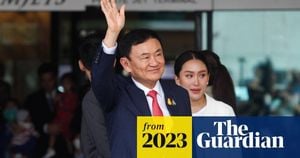The German federal elections held on February 23, 2025, yielded significant results, firmly establishing the Christian Democratic Union and Christian Social Union (CDU/CSU) as the dominant political force. With the CDU/CSU securing approximately 28.8% of the vote, candidate Friedrich Merz stands poised to become the next Chancellor of Germany.
These early elections were pivotal as they determine the governmental course for Europe’s largest economy over the next four years. The unprecedented results have reshaped the entire political spectrum, with the far-right Alternative for Germany (AfD) claiming second place with 20.2% of the vote, marking its highest-ever result. Meanwhile, the Social Democratic Party of Germany (SPD), traditionally one of the major political players, found itself on the losing end, capturing only 16.2% of the vote.
Olaf Scholz, the current Chancellor and SPD leader, acknowledged the dismal results, stating, "We live in a democratic country," as he conceded the election, which he labelled as "a bitter result for the Social Democratic Party". The recognition of defeat was significant, reflecting the SPD's worst performance since World War II. Scholz accepted responsibility, acknowledging the need for the party to regroup and reassess its approach moving forward.
"This is a historic result for us," exclaimed Alice Weidel, co-chair of the AfD, waving the German flag to celebrate her party’s rise. The AfD has significantly increased its foothold, and Weidel opened the door for coalition discussions. She remarked, "We are open to coalition negotiations... otherwise, there will be no chance to change policies in Germany." Yet, Merz has opted to distance the CDU/CSU from any partnerships with the AfD, compliculating the coalition dynamics.
The task of forming the next government now falls squarely on the shoulders of Merz. His leadership promises to differ from Scholz’s, as he declared intentions of fostering stronger alliances with key partners, aiming to bring Germany back to the center stage of European politics. Notably, he lacks prior government experience, yet pledges to provide more decisive leadership.
Robert Habeck, the Green Party leader, portrayed himself as also open to coalition discussions with both the CDU/CSU and the SPD, recognizing the potential for new governmental frameworks. He noted, "The task of forming the cabinet lies with Friedrich Merz," indicating both the expectations and pressures on the incoming leader.
Meanwhile, Jan van Aken, co-chair of The Left party, celebrated the unexpected success of his party at the polls, stating emphatically, "The Left is alive!" This enthusiasm reflects the shifting sentiments across Germany, as voters explore options beyond traditional political lines.
The results of this election not only signal the end of Scholz's tenure potentially but also reveal wider societal changes. The discontent over economic management, especially with energy prices rising and industry facing declining performance, underpins the electorate’s shift. This tumultuous political environment necessitates meaningful coalition talks as the CDU/CSU contemplates its alliances amid the fragmented parliament.
With the CDU/CSU needing to forge potentially complex coalitions, the road to governance may prove long and fraught with negotiation, disagreeing viewpoints, and political maneuvering. Despite the challenges, the election sets the stage for significant political shifts, reshaping Germany's future.
The repercussions of these elections are likely to resonate beyond Germany’s borders, especially amid current global challenges like the economic aftermath of the pandemic and persistent geopolitical tensions. Uncertainty surrounds how Merz and the new government will navigate international relations, particularly those involving the European Union and the United States, as they strive to halt the economic decline.



